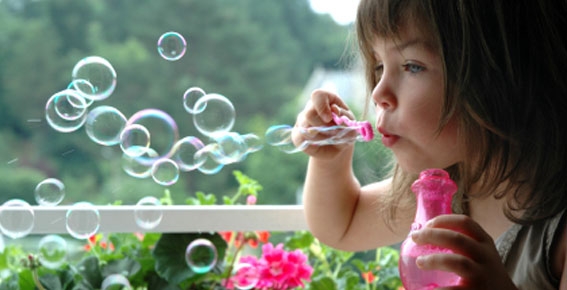Using Play to Foster Speech Development
Did you know that just by playing with your infant you can help encourage her speech and language development? We spend so much time assisting our children through day-to-day routines that we often forget to get down on the floor and just play. We spoke with Amy Keller, M.S. CCC-SLP, a speech- language pathologist who specializes in early childhood language development, who recommended a few effective ways to play with your children. She suggested modeling the use of descriptive language for your child by narrating your child’s play and actions. For example, say, “Oh, you’re putting your doll to bed. Good night dolly,” as the child tucks her doll into bed. Even very young, pre-verbal children can benefit from the example of your language modeling and play narration. For such a young child, pushing a toy car back and forth can be an opportunity to enhance language learning by verbally narrating your child’s play. For example, Keller recommends saying, “Stop! The car stopped.” “Ready set, go car!” This is also an excellent opportunity to help practice and develop early turn taking skills.
When your child is around one year old you’ll want to encourage the use of words and try to motivate your child to speak, using what speech therapists call, a “communicative temptation.” When the child wants something, it is an excellent opportunity to get her to communicate. Keller recommends sometimes placing a favorite toy or doll on a high shelf to force the child to communicate to request it verbally, or for a younger child by pointing to it. Or during snack time, give your child small portions rather than large servings and wait for a request for more.
Keller also offers these tips for playtime:
- When playing with your children, exaggerate your intonation to elicit and hold the child’s interest. This helps develop their understanding beyond words and the meanings of different intonations.
- Young children love repetition. It’s important to repeat back what your child says, to reinforce her language production and strengthen her knowledge base. Then, use your own wording to provide alternative descriptions and add context to your child’s descriptions.
- Avoid too many questions during play. Adults often ask many questions during play, and a young child might not have the vocabulary to be able to answer your questions. Instead it’s better to provide a model for the child to copy or follow. Instead of asking, “What is that doll doing?” it would be better to describe the scene for your child and say, “The doll is sleeping” or “look, she’s sleeping.”
Playtime is a great opportunity for your child to further develop her language and speech skills. In addition, play helps children socialize. When you are playing with your infant or toddler be sure to incorporate verbal modeling and encourage language development during your playtime together.
Keller recommends playing with bubbles as a fun opportunity to encourage developing language skills.
- Blow bubbles to elicit a verbal or gestural response, such as smiling.
- “Bubble” and “pop” are simple words to have the child try to pronounce.
- Have your child blow some bubbles herself. This encourages lip protrusion, lip rounding, and air emission, all oral motor skills required for speech sounds.
- Blowing bubbles is repetitive and offers you the opportunity to model various concepts and words, such as up or down, big or small bubbles, open bubble jar, and closed bubble jar.


